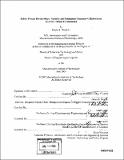Public-private partnerships : security and emergency response collaboration in a new threat environment
Author(s)
Disraelly, Deena S. (Deena Sara), 1974-
DownloadFull printable version (14.06Mb)
Other Contributors
Massachusetts Institute of Technology. Engineering Systems Division.
Advisor
James B. Rice, Jr. and Yosef Sheffi.
Terms of use
Metadata
Show full item recordAbstract
September 11th, 2001 marks the worst terrorist action to occur on United States soil and opens a new period in history in which indiscriminate terrorist acts are possible, if not probable. Many of these possible acts, as well as the actions to prevent and recover, will have an impact on the supply chain and services in ways that we cannot yet understand. Previous research has focused on theft prevention and the disruptions such thefts might cause, and very little research on the supply chain impacts of September 11th exist. What is clear, however, is that as government agencies include the creation of public-private partnerships as well as the introduction of new technology, increasing inventory, and building system resilience, among others. Limited examples of public-private partnerships for security exist, however, there are several examples of partnerships for emergency response. Since both emergency response partnerships and security collaboratives share the same objective - to protect and secure the personnel, facilities, and supply chain - this thesis investigates emergency response, early detection, and propose new policies and regulations and the threat of international terrorism continues, corporate America needs to find a method for securing their operations. These methods may post-September 11th security examples to determine the key factors in establishing successful public-private partnerships. The learnings indicate collaborative partnerships and emergency response cooperatives are the most commonly used for promoting security and that motivation, cooperative goals, communication and trust are the most important factors to creating successful partnerships. Other factors vary by level of importance depending (cont.) on the type of partnership. Public regulation requires private cooperation in order to succeed. Similarly, private sector security relies on public sector concurrence. The greater the recognized interdependence between the public and private sector, the more likely the partnership is to succeed. Recommendations include introductory steps to creating such partnerships, as well as proposed actions which both sectors should consider to ensure partnership success.
Description
Thesis (S.M.)--Massachusetts Institute of Technology, Engineering Systems Division, Technology and Policy Program; and, (M. Eng. in Logistics)--Massachusetts Institute of Technology, Engineering Systems Division, 2004. Includes bibliographical references (leaves 218-225).
Date issued
2004Department
Massachusetts Institute of Technology. Engineering Systems Division; Technology and Policy ProgramPublisher
Massachusetts Institute of Technology
Keywords
Technology and Policy Program., Engineering Systems Division.